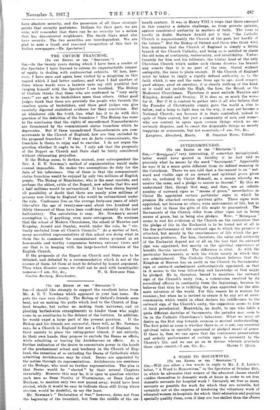INTERCOMMUNION.
(To Tat Hearse or rile SPECTATOR:1 Saa,—" Mernixi.oe," very interesting, if somewhat metaphysical, letter would have gained in lucidity if he had told us precisely what he means by the word "Sacrament." Apparently he uses it in a sense quite different from its defined meaning in the Catechism. There we are told that a Sacrament is un " out- ward and visible sign of an inward and spiritual grace given unto us, ordained by Christ Himself, es a means whereby we receive the same, and a pledge to assure us thereof." By this we understand that, though God may, and does, use au infinite number of outward signs aa " means of grace," nevertheless in Christ He appointed certain particular signs to which by promise He attached certain spiritual gifts. These signs were appointed, not because no others were instruments of life, but in order that in these the gifts of life might be guaranteed. The Sacraments of the Church differ from other signs not in being means of grace, but in being also pledges. Now, " Mensixocer " seems to rest his criticism of the Church on the contention that the pledge of life in the Eucharist is to be found not at all in the due performance of thy outward sign to which the promise is attached, but merely in the consciousness of life which the per- formance produces. For him, therefore, the value and authority of the Eucharist depend not at all on the fact that its outward sign was appointed, but merely on the spiritual experience of benefits therein. received. The difference is vital. As with the particular Sacraments, so with the whole society in which they are administered. The Catholic Churchman believes that the Kingdom of Heaven has on earth in the Church its Sacramental sign or outward embodiment authoritatively appointed, so that in it access to the true fellowship and knowledge of God might be pledged. He is, therefore, bound to maintain the outward sign of the Church's unity (via., a commission received by its accredited officers in continuity from the beginning), because ho believes that thus he is tulfilling the plan appointed for the ulti- mate salvation of the world. For this reason be is zealous for reunion; but when he is invited to create it by any act of inter- communion which would in effect declare his indifference to the outward sign of the Church's unity, the suggestion seems to him at least paradoxical. Meanwhile, no doubt, to one who holds a quite different doctrine of Sacraments, the paradox may seem to lie in the Catholic Churchman's behaviour. What we mast all desire as the first step towards reunion is mutual understanding. The first point at issue is whether there is, or is not, any essential spiritual value in specially appointed or pledged means of grace. If there is, than we can agree that the continuous preservation and orderly performance of certain signs is necessary to the Church's life, and we can go on to discuss wherein precisely
those signs consist. —1 am, Sir, Ac., Otlyze C. Quint.














































 Previous page
Previous page